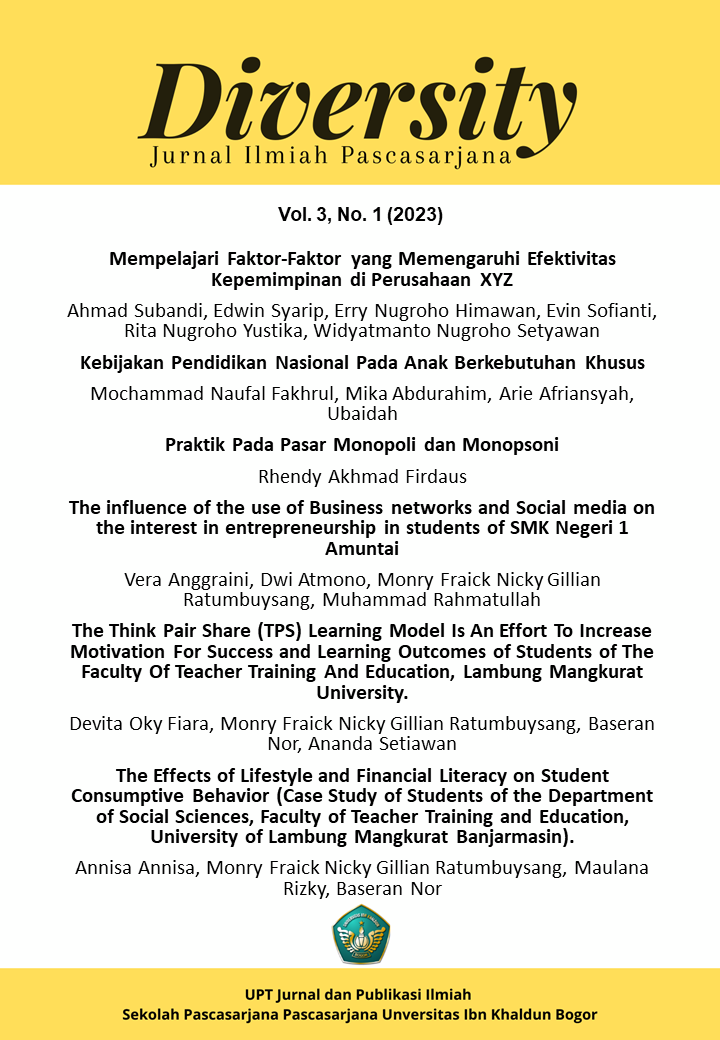The Think Pair Share (TPS) Learning Model Is An Effort To Increase Motivation For Success and Learning Outcomes of Students of The Faculty Of Teacher Training And Education, Lambung Mangkurat University.
DOI:
https://doi.org/10.32832/djip-uika.v3i1.10086Abstract
This study aims to find out the think pair share learning model to increase motivation for success and student learning outcomes at the Faculty of Teacher Training and Education, Lambung Mangkurat University. The method used in this study is classroom action research with collaborative PTK types. The research subjects consisted of 70 students of Biology Education, Faculty of Teacher Training and Education, Lambung Mangkurat University, Banjarmasin who took entrepreneurship courses for the 2022 academic year (odd semester). Data collection techniques use interviews, observations, learning outcomes tests and online questionnaires for validity and reliability tests. Data analysis uses descriptive analysis techniques, normality tests, data linearity tests and hypothesis testing (simple linear regression, t test). Based on the results of the study, it was concluded from cycles I and II that there was an increase in motivation from the success of the Think Pair Share (TPS) model by 69.88%, which is still quite good. The success of the Think Pair Share (TPS) model which is applied in improving student learning outcomes consisting of 2 cycles is carried out in accordance with research procedures, namely, planning, implementation, observation and reflection so that there is an increase of 11.09% which is still very low.
References
Anitasari, M. E., & Purworejo, U. M. (2018). INCREASING MOTIVATION AND STUDENT LEARNING OUTCOMES WITH THE THINK PAIR SHARE METHOD Mike Elly Anitasari FKIP, Muhammadiyah Purworejo University. Urnal Education Solar Education (JPSE), 4(September), 49–59.
Febnasari, S. D., Arifin, Z., & Setianingsih, E. S. (2019). Effectiveness of Using Class Discussion Learning Methods with "TPS" Strategies to Increase Learning Motivation. Elementary School Scientific Journal, 3(3), 315. https://doi.org/10.23887/jisd.v3i3.19456
Genoveva, V. (2021). Influence of Motivation, Organizational Culture And Satisfaction Of Women's Empowerment , Child Protection And. Journal of Humanities and Political Law, 1(4), 396–410.
Gusniwilda, A., Gratitude, Y., & Nurfarah. (2016). Student Attitudes and Study Habits. Journal of Counselors, 3(2), 42. https://doi.org/10.24036/02014321871-0-00
Ramadan, S., Murdiana, I. N., & ... (2015). ... Think Pair Share Type Cooperative Learning Model To Improve Student Learning Outcomes On Linear Inequality Materials.... ... Mathematics Education... . http://jurnal.fkip.untad.ac.id/index.php/jpmt/article/view/274%0Ahttps://jurnal.fkip.untad.ac.id/index.php/jpmt/article/download/274/284
Sipayung, T. N. (2018). The Relationship Between The Learning Process And. Nabla Dewantara: Journal of Mathematics Education, 3(1), 29–41. http://ejournal.unitaspalembang.ac.id/index.php/nabla/article/view/52/46
Siregat, M. H. S. (2021). Think-Pair-Share (TPS) Learning in Improving Students' Critical and Academic Thinking. JEID: Journal of Educational Integration and Development, 1(4), 270–280.
Wijaya, H. (2021). Think Pair Share Learning Based on Character Education (Issue December). https://doi.org/10.31219/osf.io/xn4dw
Yulianingsih, B., Gofur, A., & Amin, M. (2017). Application of the think pair share learning model with an inquiry approach to increase motivation and science learning outcomes in class XII SMK students. Journal of Education: Theory, Research, and Development, 2(1), 1–11.







